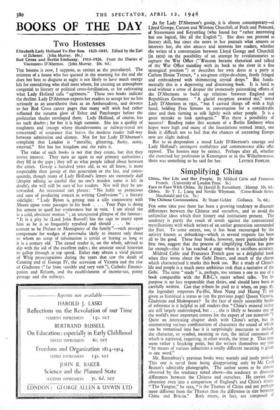BOOKS OF THE DAY
Two Hostesses
Elizabeth Lady Holland To Her Son. 1821-1845. Edited by the Earl of Ilchester. (John Murray. 18s.)
Red Cross and Berlin Embassy. 1915-1926. From the Diaries of Viscountess D'Abernon. (John Murray. 10s. 6d.) THE hostess is now, I suppose, as extinct as the pterodactyl. The mistress of a house who has queued in the morning for the cod she does her best to disguise at night is not likely to have much energy left for considering who shall meet whom, for creating an atmosphere congenial to literary or political cross-fertilisation, or for cultivating what Lady Holland calls " agremens." These two books indicate the decline. Lady D'Abernon expects her readers to accept her no less _ seriously as an anaesthetist than as an Ambassadress, and devotes to her Red Cross career pages that many will wish had rather reflected the autumn glow of Esher and Panshanger before the proletarian shades enveloped them. Lady Holland, of course, has no such doubts ; for her it is high summer. She has a quality of toughness and (except where thunderstorms or railway-travel are concerned) of assurance that leaves the modern reader half-way between admiration and dismay. Not for her Lady D'Abernon's complaint that London is " metallic, glittering, flashy, noisy, external." She has her kingdom and she rules it.
The value of such books is not that they create, but that they revive interest. They turn us again to our primary authorities ; they fill in the gaps ; they tell us what people talked about between the crises. Gossip a hundred years old, as we all know, is more respectable than gossip of this generation or the last, and conse- quently, though many of Lady Holland's letters are extremely dull (despite editing so careful that no one's maiden name is left in doubt), she will still be sure of her readers. Nor will they be un- rewarded. An occasional tart phrase: "No habit so pernicious and sure of producing conceit as writing Confessions " ; a literary sidelight: " Lady Byron is getting into a silly controversy with Moore upon some passages in his book . . . Your Papa is doing his utmost to quell her restlessness but in vain. I am afraid she is a cold, obstinate woman " ; an unexpected glimpse of the famous: " It is a pity he (Lord John Russell) has the rage to marry upon him as he is so frequently repulsed and should . . . be . . . content to be Prelato or Monsignore of the family "—such passages compensate for wedges of personalia likely to interest only those to whom no scrap of information is trivial or boring as long as it is a century old. The casual reader is, on the whole, advised to dip with the aid of the excellent index ; the amateur social historian to gallop through at top speed. Either may obtain a vivid picture of Whig preoccupations during the years that saw the death of Canning and of George IV, the accession of Victoria and the rise of Gladstone (" far from sensible and very vain "), Catholic Emanci- pation and Reform, and the establishment of income-tax, penny postage and the railways.
As for Lady D'Abernon's gossip, it is almost contemporary--of Lloyd George, Curzon and Winston Churchill, of Foch and Poincare, of Stresemann and Keyserling (who found her " rather interesting but too logical, like all the English "). She does not pretend to literary skill, but since she notes in her journals what amuses or interests her, she also amuses and interests her readers, whether she writes of a conversation between Lloyd George and Churchill (in 192o) on the possibility of an attempt by revolutionaries to capture the War Office (" Winston became rhetorical and talked of the War Office standing with its back to the river in a fine strategical position ") or describes her own dress at a party at Carlton House Terrace, "a sea-green crêpe-de-chine, freely fringed and embroidered with shimmering crystal drops." But funda- mentally this is a depressing and distressing book. It is hard to read without a sense of despair the immensely painstaking efforts of the D'Abernons to build up relations between England and Republican Germany. " A glacial reception awaited me," noted Lady D'Abernon in 1921, " but I carried things off with a high hand, holding Frau Simons in conversation for a considerable time and then turning to talk lightly with other people. It is a great mistake to look apologetic." Was there a possibility of success? Reading today this account of a Berlin Embassy when hopes were high and many of the foundations seemed intact, one finds it difficult not to feel that the chances of recreating Europe now are slight indeed.
But to so despondent a mood Lady D'Abernon's courage and Lady Holland's astringent confidence and commonsense alike offer reproof. The hostess may, be extinct. Perhaps after all, whether she exercised her profession in Kensington or in the Wilhelmstrasse, there was something to be said for her. LETTICE FOWLER.


























 Previous page
Previous page